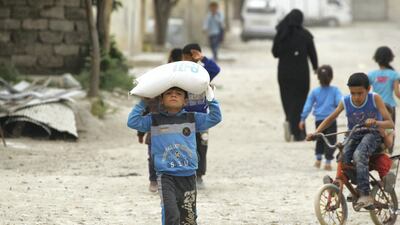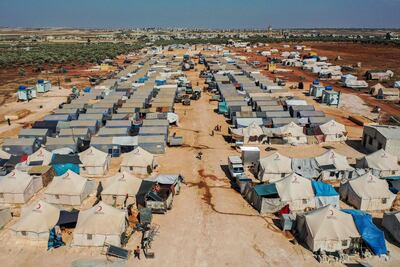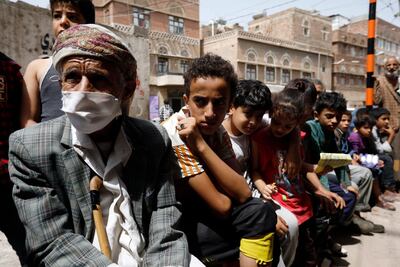The maxim is that inflation is always and everywhere a monetary phenomenon but for Arif Husain, chief economist of the World Food Programme, the issue is now more than ever a threat to life.
The onset of the Covid-19 pandemic has had a huge impact on food security for tens of millions of people.
A growing group of vulnerable countries has seen severe shortages combine with a collapse in the earning power for the poorest. Where food is in the markets, many are not able to buy.
At the front line of this turmoil is Mr Husain, who tracks the blows from the sudden disruption.
"It’s a supply-side crisis, it's a demand-side crisis, it's both at the same time and at the global level," he said.
"Even during the Second World War supply chains continued. We haven’t seen anything like this."
Two of the worst affected countries are Syria and Yemen.
Mr Husain said that before the lockdown, people would spend about 50 per cent of their income on food.
But he said that now in Syria, families were borrowing money to eat.
"In Syria the prices of our food basket has risen in the last three months by 70 per cent," Mr Husain told The National.
"Prices were up 205 per cent last year and are 15.8 times higher since the start of the war.
"With war, Covid and inflation, how do you expect people to live?"
As the UN's logistics and global food supplies arm, the WFP has stepped in to absorb some of the shocks to worldwide supplies caused by the lockdown. It has had to readjust to new pressures.
In Yemen it is central to efforts to feed 12 million people, but since spring it has had to rotate recipients monthly, giving food to six million in one month and the other six million the next.
More than 90 per cent of Yemen's food has to be brought from abroad, a vulnerability that is exposed whenever the currency weakens.
"The supply chains for these hard-hit places are not working as usual," Mr Husain said.
"If we don’t get to them because we don’t have money or the logistics don’t work, they are in trouble.
"If commercial transport doesn’t work then humanitarian transport doesn’t work."
The Yemeni riyal has lost 17 per cent of its value since the start of the year, breaching 700 to the American dollar, and there are fears it could go to 1,000 riyals by the end of 2020.
The programme needs more than $700 million (Dh2.57 billion) to sustain its operations to the end of the year.
Abeer Etefa, Mena spokeswoman for the WFP, said the shift was necessary to stop the war-torn country falling into famine.
"We have been rotating assistance to getting food every two months," Ms Etefa said.
"We need to extend the resources as much as we can. When we say the word 'famine', it means we have collectively failed this country."
What makes it harder for Mr Husain is that many of the economist's professional tools no longer function as reliable indicators.
He says 400 million people were taken out of the global workforce by lockdowns – the International Labour Organisation estimates that 93 per cent of workers were affected at some point – which means people cannot buy food.
Even if there were less food around, prices did not necessarily reflect this because consumer demand was gone.
"Price signal prices may stay normal in any given place but what’s missing is a measure of purchasing power," Mr Husain said.
"Just to go solely by prices is not OK because purchasing power is not there.
"Governments have spent $11 trillion to contain the pandemic and limit its damage, and in addition there has been $6tn provided by central banks for liquidity.
"Despite that massive injection you have 270 million people at risk of starvation in 2020."
The WFP is this year facing a 40 per cent increase in the number of people to whom it provides direct assistance, to 140 million.
Ms Etefa said prices tripled in a year in Syria.
"Apples are a luxury in Syria as the price has gone up 450 per cent," she said.
"These are very resilient people but this is pushing them to the edge."
_______________
















